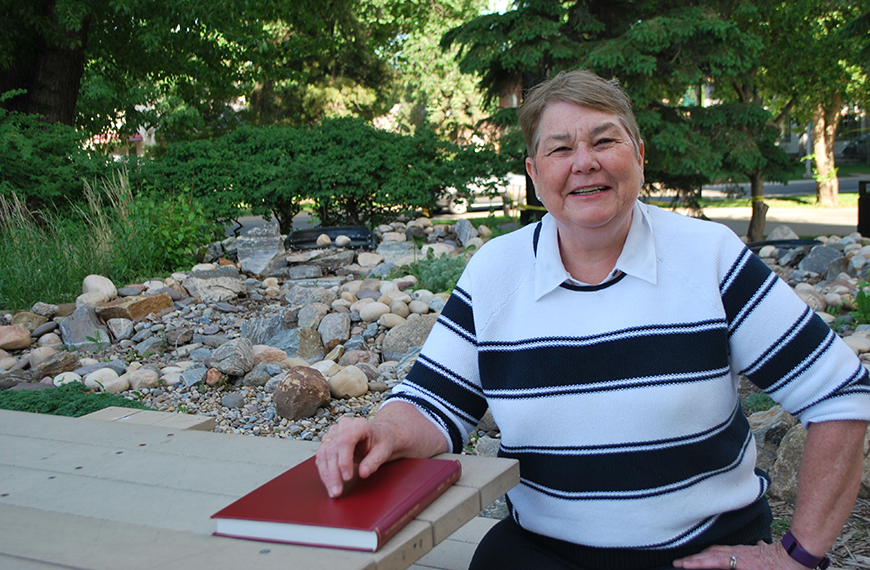
Sharon Anderson sits with her newly bound PhD thesis, which examines what happens to marriages when one member of the couple suffers a stroke.
When Sharon Anderson says that she taught her children how to waterski from a book-literally consulting it while seated in the back of a boat-believe her. It seems there's nothing this exuberant dynamo can't master through research and tenacity.
This week, Anderson convocates with a PhD in human ecology, majoring in family gerontology. Her thesis, produced under the supervision of gerontologist Norah Keating, looks at what happens to marriages after one spouse suffers a stroke, a subject Anderson knows from all perspectives.
As a mature student, she earned her doctorate, as well as two master's degrees, after helping her husband John rehabilitate his life following a stroke 20 years ago.
When her husband's stroke occurred, Anderson was deep into a career as a dental hygienist and the mother of two children, aged 11 and 16. Doctors advised her to put her then-46-year-old husband into a nursing home. She refused. Instead, she worked part time, spending many hours in the libraries of Ottawa, where she was living, reading medical journals for direction on how to help John, who had lost the use of his right side and his ability to speak.
"I looked for evidence-based research on how to treat aphasia (loss of speech) and what needed to be done physiotherapy-wise," she said. "I wanted the best evidence."
Working in conjunction with a hired physiotherapist, "I just made (John) do everything," said Anderson. Eight months later, he was cooking, walking and driving a car. His speech has since returned, and he now runs the day-to-day workings of their home.
As a former executive for a large company, John had a good insurance plan to help with his physical rehabilitation. However, as Anderson soon discovered, there are very few community supports for stroke survivors.
"You are really on your own, unlike people with Alzheimer's or Parkinson's (disease)," she said.
So Anderson hit the books again, to learn what more was possible. In 2004, she earned a Master of Education in Community Rehabilitation and Disability Studies, studying online and via a series of two-or-three week stints at the University of Calgary.
After moving the family from Ottawa to Edmonton, where she could help care for her elderly mother, Anderson next earned a Master of Science in Health Promotion at the University of Alberta's School of Public Health.
"You make lists, you get up early in the morning and work late at night, and in between you do everything that needs to be done," said Anderson, explaining how she juggled her competing responsibilities.
Following her second master's degree, Anderson helped develop and deliver social support systems as a research associate with Miriam Stewart, a professor in the Faculty of Nursing and School of Public Health, and a Health Senior Scholar with the Alberta Heritage Foundation for Medical Research.
For her PhD, Anderson sought out the Department of Human Ecology, attracted by its ecological approach to understanding the contexts of people's lives.
"It's not just about an individual; it's not just about health care," she said. "It's about community and also about looking at policy and how that can change things. Everything needs to work together."
Anderson has now examined what marriages need after a member has a stroke in order to survive and how community programs and public policy can support those needs.
Her central finding is that roles change after such an event. If couples can agree on how the marriage is reorganized, whether it is as a patient-caregiver relationship or one in which couples relate primarily as spouses, then it can remain strong.
Says Anderson, "If you're not on the same page, it doesn't work as well."
It's important for society not to simply create caregivers and patients when someone suffers a stroke, and lose sight of the fact that the people involved are also husbands and wives, said Keating.
"Sharon's work is going to have a big impact on helping people working in stroke and stroke rehabilitation understand marriage, and people in marriage counselling understand stroke," she said.
Although she will be 65 when she receives her doctorate, Anderson is continuing to study-she just completed a statistics course so that she can conduct both qualitative and quantitative research. Her goal is to remain engaged in stroke research in ways that will make a difference to stroke survivors and their families
"My mom lived to be 101-and-a-half, and I certainly have some areas where I can contribute," she said. "I have the knowledge to do that, and we need evidence-based research in our communities."